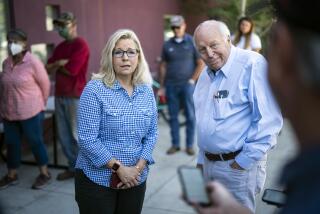Cheney Warns Against Complacency on Terrorism
- Share via
Vice President Dick Cheney delivered a somber warning Wednesday about the dangers facing the United States, telling the Los Angeles World Affairs Council that America must not be complacent about the continuing threat of terrorist attacks.
The vice president hailed recent events such as the capture of former Iraqi leader Saddam Hussein and Libya’s decision to abandon its nuclear weapons program.
But he said that “especially in moments of success, we need to remember the long-term nature of the struggle we are in, and the serious dangers that still exist.”
“We know to a certainty that terrorists will kill as many innocent people as they possibly can, limited only by the means at their disposal,” Cheney told a luncheon audience of about 600 at the Beverly Hilton.
The vice president said training manuals and interrogations of captured terrorist suspects suggest that groups such as Al Qaeda are actively seeking to acquire chemical, biological and nuclear weapons.
“Should they ever acquire such weapons, they would use them without any constraint of reason or morality,” Cheney said. “Instead of losing thousands of lives, we might lose tens or even hundreds of thousands of lives as the result of a single attack, or a set coordinated of attacks.”
The speech was part of a stepped-up schedule of public events for the vice president, who expects to become more visible as the Bush-Cheney reelection campaign picks up steam. He visited Colorado, Washington and Oregon earlier in the week and planned to continue his Western travels today with stops in Las Vegas and Phoenix.
With the campaign in mind, both President Bush and Cheney have begun to speak forcefully about what they feel is their legacy. In his World Affairs Council speech, Cheney compared the challenges of the present to those the United States faced at the outset of the Cold War.
“Within a few years after Germany and Japan surrendered, [President] Truman and his advisors saw the rise of new dangers. Imperial communism presented a challenge of global reach, demanding a comprehensive, long-term response on many fronts,” Cheney said.
“President Truman made clear at the outset that the United States recognized the danger, and that -- for the sake of future generations -- we would face it squarely.”
Truman created a new government infrastructure to battle the Cold War, including the Defense Department, the CIA and the National Security Council. Similarly, he said, Bush has built a Department of Homeland Security to combat the threat of terrorism.
“All those early commitments, made by one president and carried forward by eight of his successors, helped to bring victory in the Cold War, and unprecedented success for the cause of freedom,” Cheney said. “In this new century, facing new dangers, the commitments we make will also be decisive.”
The vice president said use of force is a “last resort” for the administration. But he said that since Cold War strategies such as containment and deterrence don’t work with terror networks, the administration had no choice but to be more aggressive.
“Given these realities, there can be no waiting until the danger has fully materialized. By then it would be too late,” Cheney said. “And so we are waging this war in the only way it can be won -- by taking the fight directly to the enemy.” At the same time, he said, “we recognize that lasting security depends on more than military power.”
“In the decades after World War II, dangers in Europe fell away as the frontiers of democracy advanced -- in Germany and Italy and behind the Iron Curtain. The lesson is that the spread of democratic institutions is the surest way to bring peace among nations,” the vice president said.
Responding to questions, Cheney argued that Bush’s proposed temporary worker plan was not just a humanitarian program, but a way to improve national security.
“The problem we have today is we have millions of illegal, undocumented workers in our midst,” the vice president said. “We do not know when they came. We do not know how long they stay. We do not know what they do while they’re here. We do not know when they leave.
“From the standpoint of homeland security and securing the nation’s borders, it is a major hole, if you will, in terms of our overall situation.”
More to Read
Get the L.A. Times Politics newsletter
Deeply reported insights into legislation, politics and policy from Sacramento, Washington and beyond. In your inbox twice per week.
You may occasionally receive promotional content from the Los Angeles Times.







